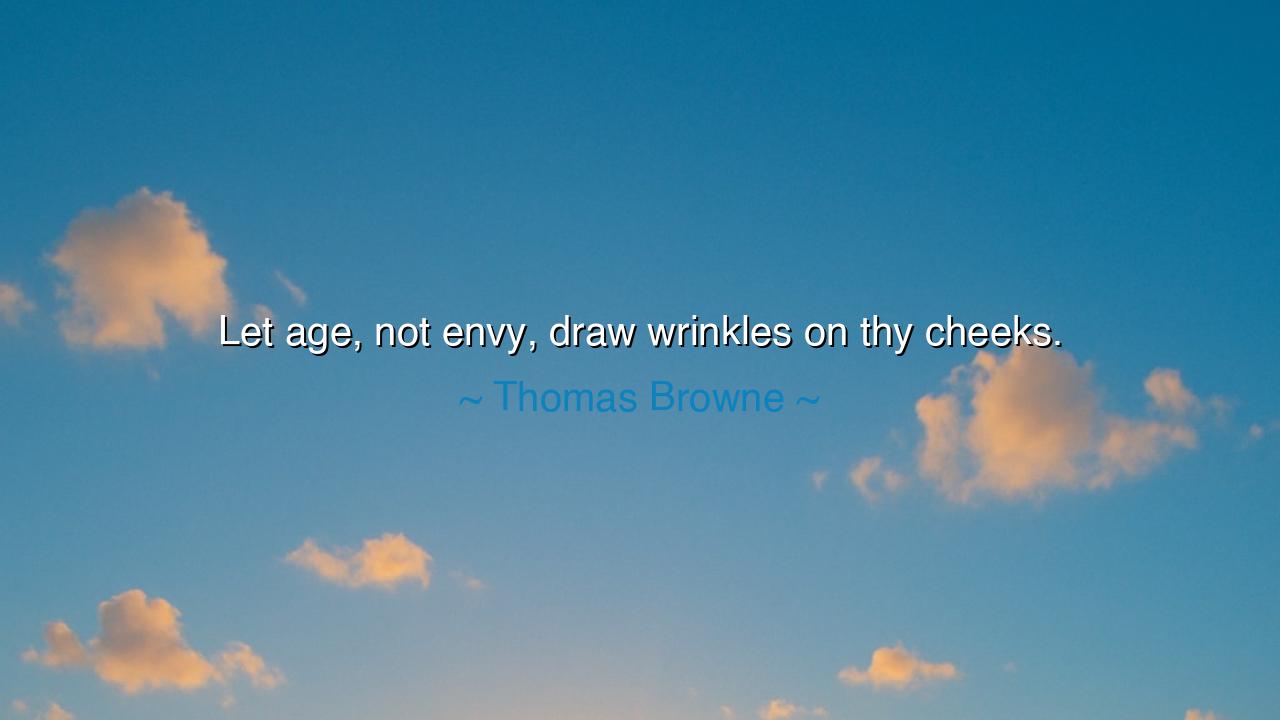
Let age, not envy, draw wrinkles on thy cheeks.






"Let age, not envy, draw wrinkles on thy cheeks." – Thomas Browne
In these timeless words, Thomas Browne offers a profound reflection on the nature of aging and the destructive power of envy. He speaks of the wrinkles that form not merely as a result of the passing of time, but as a mark of wisdom, experience, and the acceptance of life’s inevitable flow. Wrinkles, in this sense, are not a sign of decay but of the grace that comes from embracing each year with dignity. Browne warns us, however, that if we allow envy—the poison of comparison and jealousy—to take root in our hearts, it will be envy, not age, that truly mars our spirit and leaves lines upon our face. For it is envy that causes turmoil and restlessness within the soul, not the passage of time.
The message here is clear: age is a natural part of life, and it brings with it the beauty of growth and self-realization. To age gracefully is to accept the changes that come, to understand that each wrinkle is earned through the journey of living fully. But when we allow envy to take hold, we turn away from the wisdom that time offers and instead focus on what others have or what we feel we have missed. Envy twists the heart, preventing it from experiencing the joy of what has been and filling it instead with a longing for what we do not possess. It is this envy, not age, that draws the deepest and most harmful lines across our spirit.
Consider the example of Marcus Aurelius, the Roman emperor and philosopher, whose stoic wisdom teaches us to embrace life with grace and acceptance. As he grew older, Marcus Aurelius did not focus on the encroaching frailty of his body but rather on the strength of his character and the duty he had to his people. His writings, particularly in his work Meditations, reflect a man who had made peace with the passing of time, seeing each wrinkle as a testament to the life he had lived in service to virtue. He did not waste his energy on envy of others, but instead sought to improve himself and honor the role he was given. His life teaches us that wisdom comes not from the desire to possess what others have, but from accepting and being content with the path we walk.
In contrast, Catherine de Braganza, the Queen of England in the 17th century, was often caught in the shadows of envy. While she was a queen in title, her position was fraught with rivalry, as she constantly sought the approval of those around her, especially her husband, King Charles II. Her struggles with envy and self-doubt overshadowed her ability to enjoy the power and position she held. It was her inner turmoil, rather than her external circumstances, that caused her spirit to wither. Catherine’s life is a reminder that it is not the years we live that define us, but how we choose to respond to life’s challenges. Envy draws wrinkles on the face of the soul, leaving scars deeper than any physical mark of time.
The lesson in Browne’s words is this: acceptance of age and time is the key to inner peace. Each wrinkle, each line etched upon the face, tells the story of a life well-lived. The true measure of beauty lies not in youthful perfection but in the strength and wisdom that time bestows upon us. Yet, the most damaging force to the soul is not the natural process of aging, but the corrosive effect of envy. To envy is to reject one’s own journey and to feel sorrow for the path we are walking. It is a denial of the unique gifts we have been given, and it blinds us to the richness that each day brings. Envy keeps us looking at others, forever comparing, forever dissatisfied.
Instead, we must strive to cultivate a spirit of gratitude, looking within and appreciating the years we have lived, the lessons we have learned, and the blessings that have come our way. Aging, in its true sense, is a process of becoming—of embracing who we are and where we’ve been. To reject envy is to honor our own story, to live each moment with authenticity and grace. Only then can we age with the dignity that Browne speaks of, allowing time to gently shape us into the people we are meant to become, rather than allowing the bitterness of envy to twist and distort our spirit.
The practical action, then, is to accept the passage of time with an open heart. Let envy go, for it is an illusion that prevents you from seeing the beauty of your own path. Instead, nurture the gift of self-reflection, allowing each wrinkle to tell the story of your resilience, your growth, and your strength. Seek not to be like others, but to become the fullest version of yourself, embracing the wisdom that comes with age and the strength of character that comes from living without the poison of comparison. Let the wrinkles on your face be drawn by age, by experience, and not by the destructive force of envy.






AAdministratorAdministrator
Welcome, honored guests. Please leave a comment, we will respond soon